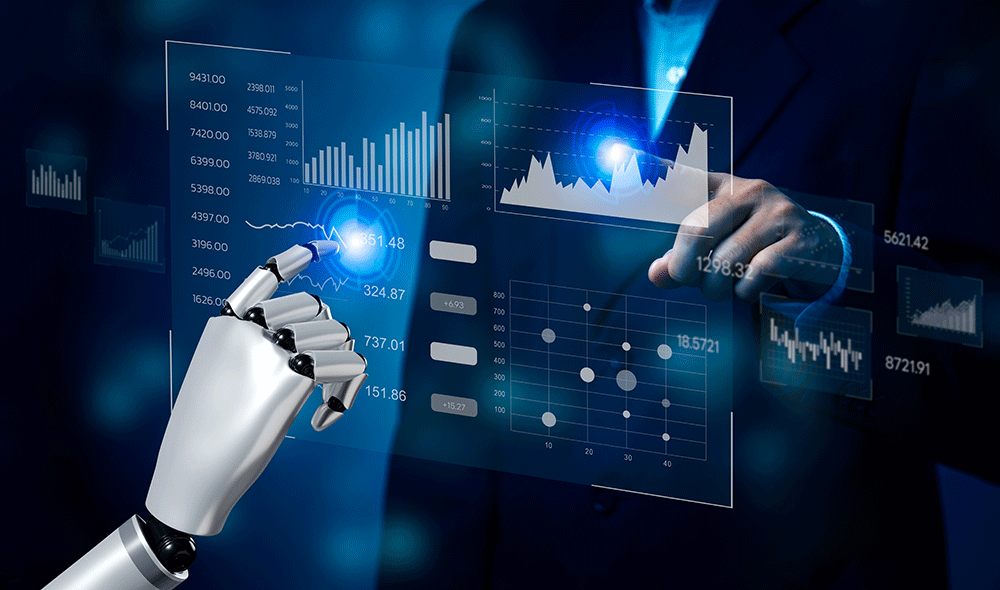Artificial intelligence and machine learning are transforming healthcare technology (a.k.a., health tech) with algorithms capable of “intelligently” analyzing vast troves of medical data. Health tech AI is driving advancements in medical diagnostics, research, client care, and more, helping healthcare organizations save money and improve productivity while increasing their standard of care.
In this blog, we’ll discuss 11 exciting health tech AI use cases and examples, and then offer some additional resources to help you get started on your own health tech development project.
11 Health Tech AI Use Cases and Examples

11 Health Tech AI Use Cases and Examples-Triangle
1.
,
Medical Imaging & Diagnostics
Artificial intelligence and machine learning algorithms can analyze CT (computed tomography) scans, MRIs (magnetic resonance imaging), X-rays, and other medical images to help provide additional insights or catch issues that medical professionals may have missed.
In addition, AI and ML can aid diagnostics by analyzing patient records using natural language processing (NLP), combining insights from multiple sources to synthesize better diagnoses and treatment options.
2. Personalized Treatment
Artificial intelligence software can analyze patient health records and genetic information to help create personalized treatment plans that minimize side effects and drug interactions. AI technology can also review a patient’s medical history, genetics, and lifestyle factors to predict disease risks like cancer, heart disease, or diabetes and recommend treatment options to mitigate these risks.
3. Chronic Disease Management
Caregivers and patients can use AI to help manage chronic illnesses like diabetes, arthritis, Alzheimer’s, and cancer. The algorithms analyze years of patient records and create personalized treatment plans based on their specific history, lifestyle, and current health status. AI applications enable continuous in-home monitors and wearable devices – like pacemakers and glucose meters – to alert patients and caregivers of potential problems before they become medical crises.
4. Remote Patient Care
Internet of Things (IoT) medical technology, such as wearable insulin monitors and pulse oximeters, helps improve the quality of patient care, both at home and in the community. Patients and caregivers can use AI-powered solutions that monitor and analyze data generated by remote medical devices and alert them of potential emergencies.
These solutions can also provide enhanced treatment recommendations based on real-time patient conditions. AI remote patient care helps minimize inpatient stays and in-person appointments, which saves time, money, and countless frustrations – by reducing the risk of hospital- or clinic-acquired infections.
5. Virtual Assistants
AI assistants and chatbots provide patients with convenient online services while reducing the workload for customer-facing medical staff. AI-powered virtual assistants can answer basic billing and insurance questions, guide patients through scheduling appointments online, recommend particular specialists for specific medical issues, and much more.
6.
,
Administrative Automation
In addition to automating patient-facing workflows, AI can also automate other office and administrative tasks. AI solutions can help with electronic health record (EHR) management, staff scheduling, medical recordkeeping, collecting patient-reported outcomes (PROs), and more. While AI should never replace office staff, it can make their lives significantly easier by reducing the more tedious aspects of their job and reducing burnout.
7. Predictive Equipment Maintenance
Regular maintenance of medical equipment is key to preventing expensive breakdowns, but taking machines down for cleaning and repairs also affects the provider’s bottom line. AI-powered predictive maintenance software monitors equipment in real-time to establish proactive maintenance schedules based on actual wear-and-tear, striking the perfect balance between preventive care and operational efficiency.
AI can also detect potential issues before equipment crashes, helping to prevent errors or further downtime. Predictive maintenance also helps maximize the efficiency and lifetime of expensive medical equipment to ensure organizations get the most out of their investments.
8.
,
Drug Discovery
Pharmaceutical researchers can use AI to analyze chemical compounds for therapeutic effects to speed up the drug discovery process. This not only accelerates pharmaceutical companies' R&D process but also assists in the critical mission of discovering new antibiotics to combat the worsening crisis of antibiotic-resistant bacteria.
9. Clinical Trials
Artificial intelligence can help streamline clinical trial creation and management while improving outcomes. AI solutions can analyze large datasets of patient information to identify individuals who would make the best candidates for a particular trial, significantly shortening the selection process and, often, resulting in a more diverse cohort. AI can also be used to analyze trial data to uncover unexpected insights, automate administrative workflows (more on that below), and predict potential issues before they affect trial results.
10. Genomic Data Analysis
Genomic analysis involves combing through vast volumes of genetic data, something that AI excels at. AI algorithms can help identify risk factors and develop personalized treatment plans based on individual genetic profiles much faster than manual methods. They’re also used to streamline genetic research that could result in new advancements in the treatment of inherited, chronic illnesses like Huntington's disease and cystic fibrosis.
11. Medical Research
Artificial intelligence can analyze vast amounts of data from many different sources, making it an invaluable tool for medical research. Using NLP, researchers can review thousands of studies, clinical records, and textbooks to uncover insights in a fraction of the time as manual literature reviews, accelerating the pace of new developments.
[object Object]
Getting Started With Health Tech AI
Whether you’re creating your own health tech application or integrating an off-the-shelf solution into your existing stack, adding AI to the mix makes things significantly more challenging. Many brands struggle to hire and retain quality staff with specialized AI expertise due to a tech talent shortage in the US. These obstacles contribute to the high cost of purchasing, creating, and implementing AI-powered solutions, and make it difficult for smaller or budget-conscious companies to enter the health tech AI field.
The easiest, most cost-effective way to rise above these challenges is to work with an outsourcing firm with AI expertise. For example, Divelement offers nearshore AI consulting and development services based in Mexico - and we deliver exceptional results at a fraction of the time and cost of in-house teams. We’ll help you start saving lives sooner.
Divelement can augment your existing staff with experts who specialize in your chosen AI technology. We’ll also advise you on the best practices for securing your AI solution, build your whole project from scratch, or anything in between. We’re like spackle, except we use human nerds to fill the gaps in your tech capabilities.
Schedule a free consultation to learn how Divelement can accelerate your health tech AI project. Give us a call – we can’t wait to talk tech with you!























